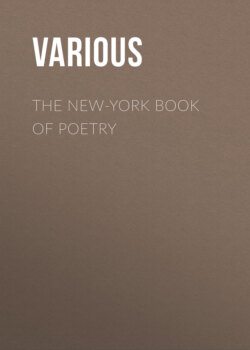Читать книгу The New-York Book of Poetry - Группа авторов - Страница 12
На сайте Литреса книга снята с продажи.
THE DEAD OF 1832.
ОглавлениеTable of Contents
BY R. C. SANDS.
Ob: 1832, æt. 33.
Oh Time and Death! with certain pace, Though still unequal, hurrying on, O'erturning, in your awful race, The cot, the palace, and the throne!
Not always in the storm of war, Nor by the pestilence that sweeps From the plague-smitten realms afar, Beyond the old and solemn deeps:
In crowds the good and mighty go, And to those vast dim chambers hie:— Where, mingled with the high and low, Dead Cæsars and dead Shakspeares lie!
Dread Ministers of God! sometimes Ye smite at once, to do His will, In all earth's ocean-sever'd climes, Those—whose renown ye cannot kill!
When all the brightest stars that burn At once are banished from their spheres, Men sadly ask, when shall return Such lustre to the coming years?
For where is he [A]—who lived so long— Who raised the modern Titan's ghost, And showed his fate, in powerful song, Whose soul for learning's sake was lost?
Where he—who backwards to the birth Of Time itself, adventurous trod, And in the mingled mass of earth Found out the handiwork of God? [B]
Where he—who in the mortal head, [C] Ordained to gaze on heaven, could trace The soul's vast features, that shall tread The stars, when earth is nothingness?
Where he—who struck old Albyn's lyre, [D] Till round the world its echoes roll, And swept, with all a prophet's fire, The diapason of the soul?
Where he—who read the mystic lore, [E] Buried, where buried Pharaohs sleep; And dared presumptuous to explore Secrets four thousand years could keep?
Where he—who with a poet's eye [F] Of truth, on lowly nature gazed, And made even sordid Poverty Classic, when in his numbers glazed?
Where—that old sage so hale and staid, [G] The "greatest good" who sought to find; Who in his garden mused, and made All forms of rule, for all mankind?
And thou—whom millions far removed [H] Revered—the hierarch meek and wise, Thy ashes sleep, adored, beloved, Near where thy Wesley's coffin lies.
He too—the heir of glory—where [I] Hath great Napoleon's scion fled? Ah! glory goes not to an heir! Take him, ye noble, vulgar dead!
But hark! a nation sighs! for he, [J] Last of the brave who perilled all To make an infant empire free, Obeys the inevitable call!
They go—and with them is a crowd, For human rights who thought and did, We rear to them no temples proud, Each hath his mental pyramid.
All earth is now their sepulchre, The mind, their monument sublime— Young in eternal fame they are— Such are your triumphs, Death and Time.
